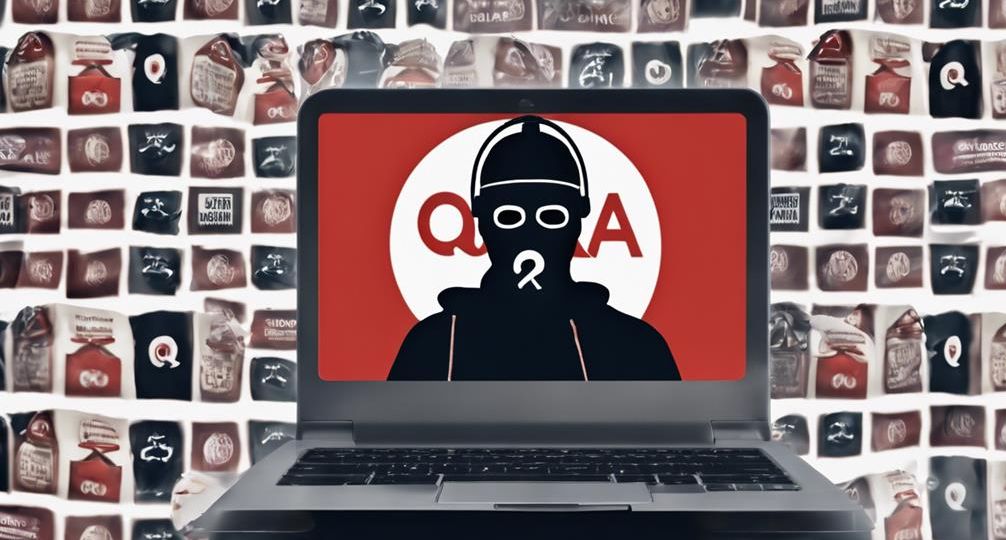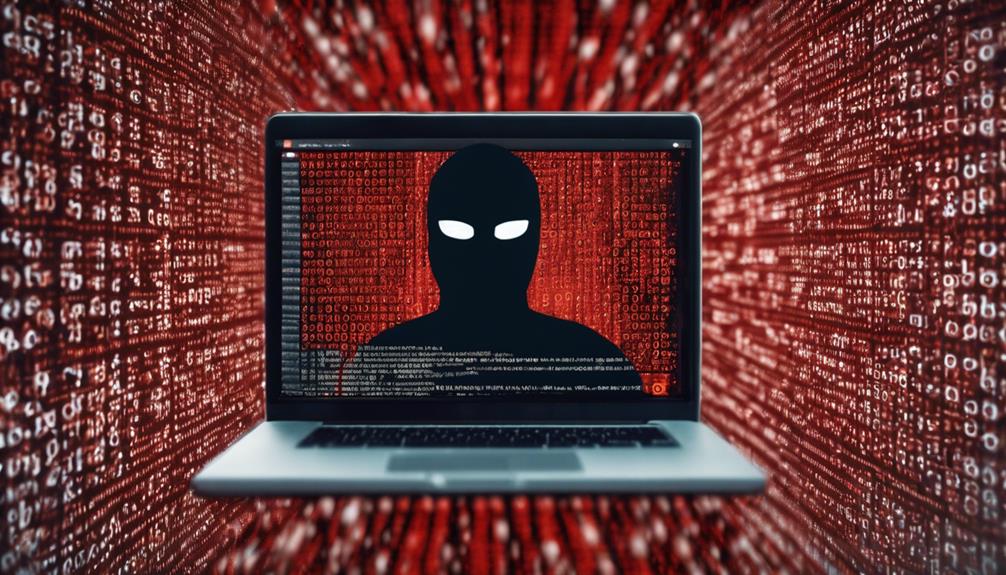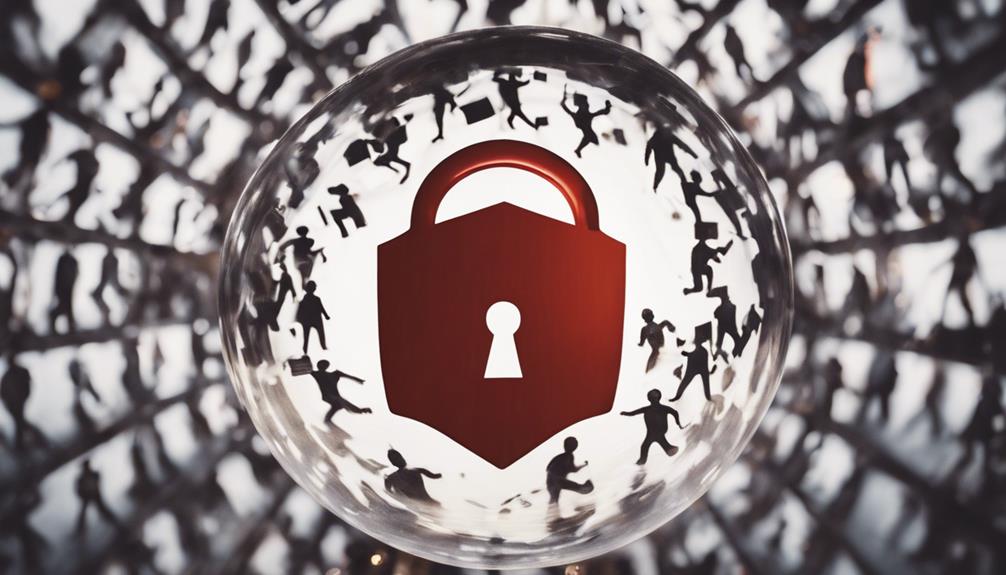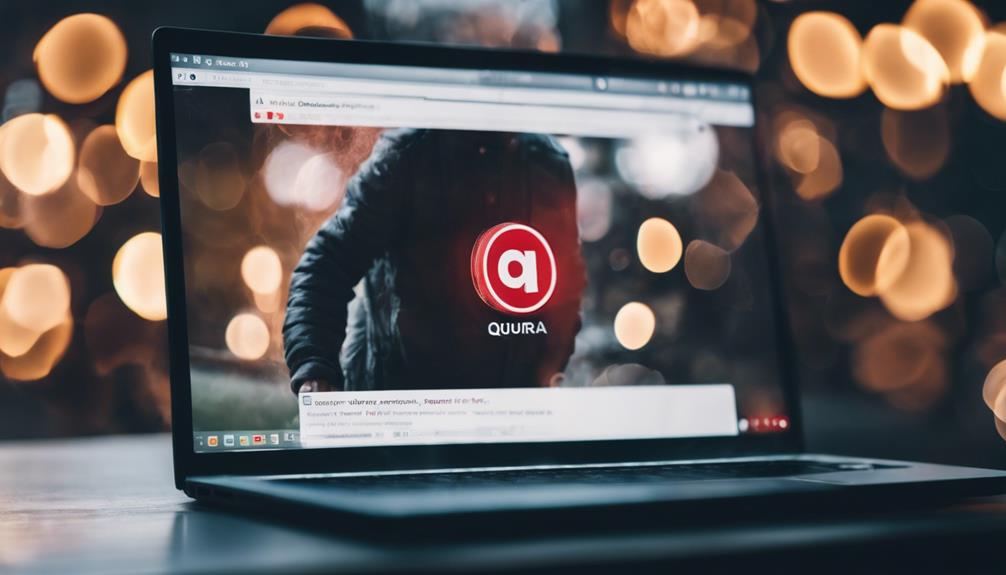
Is Quora anonymous safe?
Did you know that over 40% of Quora’s content comes from anonymous users? That’s a significant amount, especially when you consider how it impacts the platform’s overall quality and safety.
As you navigate through Quora, you’ve probably wondered how secure the anonymous feature is. Can it truly safeguard your identity? Will it protect your privacy as you share and gain knowledge?
The answers might not be as straightforward as you’d think, sparking an interesting debate that’s worth your time.
Key Takeaways
- Quora’s anonymous feature allows users to engage openly, but still requires adherence to platform guidelines.
- Safety measures like user verification and content moderation are in place, but anonymity can still lead to misinformation and harassment.
- Misuse of anonymity can result in cyberbullying and false information, highlighting the need for anonymous identity verification.
- Ethical use of anonymity on Quora is crucial, balancing user safety and freedom of expression.
Understanding Quora’s Anonymity Feature

So, how does Quora’s anonymity feature work and what does it really mean for users? Essentially, this feature allows you to conceal your identity when asking or answering questions. This aspect of identity concealment comes with its own set of benefits and drawbacks, which encompass the realm of anonymity ethics.
By using this feature, you’re afforded the freedom to express your thoughts without fear of judgment or backlash. It’s a tool that encourages open dialogue and fosters an environment of intellectual honesty. On the flip side, it can also be exploited. The veil of anonymity can provide a platform for malicious users to spread misinformation or engage in harassment.
Anonymity on Quora is a double-edged sword. It can lead to a rich exchange of ideas, but it can also create a breeding ground for unethical behavior. As a user, you’re tasked with navigating this delicate balance, leveraging the benefits and mitigating the risks.
The Mechanics of Quora Anonymous
Now, let’s unpack how the Quora anonymous feature operates and what it entails for the user. When you choose to go anonymous, your identity is masked from other users. You can ask questions, answer posts, and even comment on others’ inputs without revealing your true identity. However, remember, Quora itself can still access your data, a critical point on the scale of anonymity ethics.
The mechanics of this feature shine a light on user authenticity. As an anonymous user, you can contribute genuine insights without the pressure of judgment or backlash. But remember, the anonymity feature isn’t a carte blanche to disregard Quora’s guidelines. The platform maintains a stringent policy against hate speech, harassment, or any form of unethical conduct.
In essence, Quora’s anonymous feature offers a balance between user privacy and community engagement. It’s a tool designed with innovation in mind, fostering a sense of freedom, yet ensuring user authenticity and upholding anonymity ethics. However, it’s equally important to remember that this anonymity isn’t an absolute shield. Quora still holds the right to access and manage your data responsibly.
Safety Measures on Quora

Navigating through Quora’s safety measures, you’ll find they’re designed to protect both the identity and integrity of users while fostering a healthier community discourse. User verification and community moderation play significant roles in this regard.
User verification is a tool for keeping trolls and spammers at bay. Providing a valid email or connecting a social media account ensures the person behind the account is real. Community moderation, on the other hand, is a collaborative effort by users to ensure the content shared aligns with Quora’s policies and guidelines.
Here’s an overview of the safety measures:
| Safety Measure | Description |
|---|---|
| User Verification | Ensures the person behind the account is real |
| Content Moderation | Monitors content for compliance with Quora’s guidelines |
| Report Abuse Button | Allows users to flag inappropriate content |
| Block User Feature | Gives users the power to limit interactions |
| Privacy Settings | Control over who sees your activity |
These measures, when used effectively, can create a safer and more respectful platform where knowledge and insights can be shared freely and confidently.
Potential Risks of Anonymity
While Quora’s anonymity feature can empower you to ask and answer freely, it may also create potential risks.
The cloak of anonymity can breed misinformation, as accountability dwindles.
Furthermore, the balancing act between privacy and security becomes more complex, and issues of anonymous harassment may arise.
Anonymity Breeds Misinformation
In the labyrinth of anonymous posts on Quora, it’s easy for misinformation to spread like wildfire, presenting a significant risk to users looking for reliable answers. Anonymity consequences can often lead to misinformation propagation, as users feel shielded by the lack of personal identification. Thus, they may spread false or misleading information without fear of accountability.
Here is a brief comparison:
| Anonymity Consequences | Misinformation Propagation |
|---|---|
| Lack of accountability | Spread of false information |
| Shield of personal identification | Misleading interpretations |
| Freedom of expression | Confusion and mistrust |
| Potential for abuse | Devaluation of platform’s credibility |
The potential risks are clear. Anonymity, while fostering freedom of expression, can also breed misinformation and diminish the credibility of platforms like Quora. Therefore, it’s vital to approach anonymous sources with a healthy dose of skepticism.
Privacy Versus Security
Balancing privacy and security presents yet another layer of complexity in the anonymity debate on Quora. You might appreciate the privacy that anonymity affords, but it’s crucial to remember the potential security loopholes it can create. Anonymity can provide a fertile ground for privacy invasion, as users feel invincible behind faceless profiles, possibly leading to misuse of personal data.
Innovative solutions are required to tackle this issue. Quora must tighten its security measures without compromising the user’s right to privacy. It’s about finding a sweet spot that respects your privacy, ensuring you’re not subjected to unsolicited intrusion, while also fortifying its systems against security breaches. This balance between privacy and security is vital in maintaining trust and ensuring the safety of its user base.
Anonymous Harassment Issues
You might relish the cloak of anonymity on Quora, but it’s crucial to consider the potential threat of anonymous harassment. The dark side of digital anonymity can manifest as relentless cyberbullying, with dire consequences. Anonymity regulation becomes essential to curb such issues.
| Anonymity | Cyberbullying | Consequences |
|---|---|---|
| Anonymity allows freedom of expression | Unchecked, it can lead to cyberbullying | This can result in severe mental distress |
| Regulation helps maintain decorum | It can prevent online harassment | This contributes to a safer digital space |
| However, it can limit user engagement | It’s a necessary trade-off | Ensuring user safety is paramount |
While anonymity spurs innovation, it’s key to strike a balance. Quora must innovate ways to protect users from anonymous harassment while still fostering a platform for uninhibited knowledge exchange.
Case Studies: Anonymity Misuse
Let’s delve into specific instances where the veil of anonymity on Quora has been misused, leading to serious implications. These case studies underscore the importance of anonymity ethics and the urgent need for anonymous identity verification.
- Cyber bullying: In one upsetting instance, a user was persistently targeted by anonymous trolls, who used the anonymity feature to post abusive and threatening messages. The victim reported the issue, but the anonymous offenders were difficult to track down.
- False information: In another case, an anonymous user deliberately spread misinformation about a sensitive subject. This triggered a chain reaction of confusion and argument, which could have been avoided with identity verification to hold the user accountable.
- Personal details exposure: A user’s confidential information was anonymously posted on Quora, leading to severe privacy invasion. This incident raised questions about the ethical use of anonymity and the platform’s responsibility to protect its users.
These incidents demonstrate the potential misuse of Quora’s anonymity feature. Striking a balance between freedom of speech and the prevention of such abuse is a challenge that demands innovative solutions. The question remains: Is Quora anonymous safe? The answer, as these case studies suggest, isn’t a simple one.
Tips for Safe Usage of Quora Anonymous

Navigating the waters of Quora’s anonymous feature can be tricky, but there are specific strategies one can employ to ensure a safer experience. It’s crucial to understand the Anonymity Ethics that Quora promotes. This means respecting others’ rights to anonymity while maintaining your own Anonymous Identity.
Here’s a simple guide to help you:
| Tip | Description |
|---|---|
| Respect Privacy | Don’t try to guess or reveal someone’s anonymous identity |
| Be Ethical | Use anonymity to add value to discussions, not for trolling or harassment |
| Stay Secure | Regularly update your password and use two-factor authentication |
| Report | If you see any abuse, report it to Quora promptly |
By adhering to these basic principles, you can leverage the power of anonymity without jeopardizing your safety or the safety of others. Remember, the purpose of Quora’s anonymous feature is to foster open, unbiased discussions. It’s not a shield for unethical behavior.
Innovation in the digital space is exciting, but it comes with its own set of challenges. Using Quora’s anonymous feature responsibly reflects not only on your digital footprint but also on the platform’s integrity. Be wise, be safe, and enjoy the journey of knowledge sharing.
Reflecting on Quora’s Anonymity Debate
The debate surrounding Quora’s anonymity feature has grown increasingly contentious, with numerous users weighing in on its benefits and drawbacks. Anonymity ethics and user identity come to the fore in this discussion, revealing a complex web of concerns and ideas.
Consider the following points:
- Anonymity can empower users to share sensitive experiences or controversial opinions without fear of backlash. This freedom often leads to the sharing of unique and profound insights that might otherwise remain hidden.
- However, the shield of anonymity can also be misused, enabling cyberbullying, hate speech, or misinformation. This potential for abuse raises significant ethical questions about the responsibility of platforms like Quora to monitor and regulate content.
- Balancing user safety and freedom of expression is a complex task. It’s a constant tug-of-war between protecting user identity and ensuring a platform for open, honest discussion.
Innovation and progress in this sphere lie in finding a middle ground – a way to uphold both the ethical responsibilities of anonymity and the integrity of user identity. As you navigate the Quora platform, this debate will undoubtedly shape your experience and influence your interactions.

